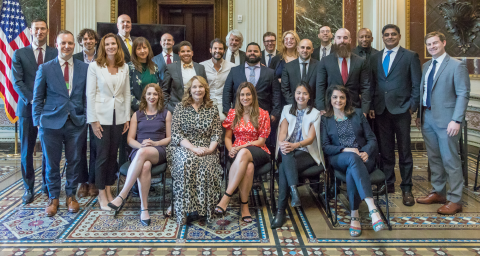Artificial intelligence
Artificial intelligence involves machines programmed to learn and reason.
Artificial intelligence (AI) is an emerging technology where machines are programmed to learn, reason, and perform in ways that simulate human intelligence. Although AI technology took a dramatic leap forward, the ability of machines to automate manual tasks has been around for a long time. Today’s AI can analyze vast amounts of data to identify patterns and trends, providing insights to improve decisions in areas like resource allocation and risk management. Follow your agency’s guidance on security and best practices when using AI.
Executive Order 14110: Safe, Secure, and Trustworthy Artificial Intelligence

Resources on Artificial intelligence
-
Administration Actions on AI
Steps to promote the safe, secure, and trustworthy use of AI. Includes: progress reports, federal agency use cases, and voluntary private sector commitments, as well as the Blueprint for an AI Bill of Rights, NIST AI Risk Management Framework, National AI R&D Strategic Plan, and National AI Research Resource (NAIRR) Pilot.
-
Executive Order on the Safe, Secure, and Trustworthy Development and Use of Artificial Intelligence
Establishes new standards for AI safety and security, protects Americans’ privacy, advances equity and civil rights, stands up for consumers and workers, promotes innovation and competition, advances American leadership around the world, and more.
-
National Artificial Intelligence Research and Development Strategic Plan (PDF, 861 KB, 56 pages) 2023 Update
A report by the Select Committee on Artificial Intelligence of the National Science and Technology Council.
-
Blueprint for an AI Bill of Rights
From the White House Office of Science and Technology Policy (OSTP), the Blueprint for an AI Bill of Rights is a set of five principles and associated practices to help guide the design, use, and deployment of automated systems to protect the rights of the American public in the age of artificial intelligence.
Join a Community of Practice
-
Artificial Intelligence
Ensure artificial intelligence (AI) tools are implemented in ways that are transparent, equitable, and secure.
Artificial intelligence events
Overview of NIST Initiatives on Artificial Intelligence Standards, Principles, and Critical AI Issues
Artificial intelligence news
Administration Actions on AI
Steps to promote the safe, secure, and trustworthy use of AI. Includes: progress reports, federal agency use cases, and voluntary private sector commitments, as well as the Blueprint for an AI Bill of Rights, NIST AI Risk Management Framework, National AI R&D Strategic Plan, and National AI Research Resource (NAIRR) Pilot. — via AI.gov

Back to basics in the age of AI
The federal government is actively discussing the transformative potential of artificial intelligence (AI). It has the potential to transform our digital service delivery, automate tasks, and enhance data analysis. However, AI also presents challenges and risks such as bias and ethical concerns. The team at 18F provides a quick overview of AI, its place in government today, and the techniques and frameworks they are currently using to navigate this complex new landscape. — via 18F

Search.gov year in review: 2023 report
Learn what types of information people searched for on federal websites in 2023, see emerging trends the team is exploring to improve customers’ search experience in 2024, and check out three new updates. The data tab provides insightful summaries for 13 popular topic areas—and lists the public’s top 25 search terms, in their own words, for each. — via Search.gov

Executive Order on the Safe, Secure, and Trustworthy Development and Use of Artificial Intelligence
Establishes new standards for AI safety and security, protects Americans’ privacy, advances equity and civil rights, stands up for consumers and workers, promotes innovation and competition, advances American leadership around the world, and more. — via The White House

Readout of White House Roundtable on Artificial Intelligence and Health
The White House Office of Science and Technology Policy (OSTP) this week convened a roundtable that highlighted the Biden-Harris Administration’s priorities to develop and deploy advanced AI tools that benefit the health and wellbeing of all Americans. The discussion focused on deepening awareness and understanding of the benefits and risks of AI and welcoming new ideas on the responsible development of AI to improve health outcomes for all Americans. Working sessions focused on specific use cases, including where AI can be used to mitigate public health challenges, and improve access by supporting equitable health decision-making in resource-limited settings. — via The White House

Resources on Artificial intelligence
-
Administration Actions on AI
Steps to promote the safe, secure, and trustworthy use of AI. Includes: progress reports, federal agency use cases, and voluntary private sector commitments, as well as the Blueprint for an AI Bill of Rights, NIST AI Risk Management Framework, National AI R&D Strategic Plan, and National AI Research Resource (NAIRR) Pilot.
-
Executive Order on the Safe, Secure, and Trustworthy Development and Use of Artificial Intelligence
Establishes new standards for AI safety and security, protects Americans’ privacy, advances equity and civil rights, stands up for consumers and workers, promotes innovation and competition, advances American leadership around the world, and more.
-
National Artificial Intelligence Research and Development Strategic Plan (PDF, 861 KB, 56 pages) 2023 Update
A report by the Select Committee on Artificial Intelligence of the National Science and Technology Council.
-
Blueprint for an AI Bill of Rights
From the White House Office of Science and Technology Policy (OSTP), the Blueprint for an AI Bill of Rights is a set of five principles and associated practices to help guide the design, use, and deployment of automated systems to protect the rights of the American public in the age of artificial intelligence.
More News and Events on Artificial intelligence
25 posts
Back to basics in the age of AI
The federal government is actively discussing the transformative potential of artificial intelligence (AI). It has the potential to transform our digital service delivery, automate tasks, and enhance data analysis. However, AI also presents challenges and risks such as bias and ethical concerns. The team at 18F provides a quick overview of AI, its place in government today, and the techniques and frameworks they are currently using to navigate this complex new landscape. — via 18F

Search.gov year in review: 2023 report
Learn what types of information people searched for on federal websites in 2023, see emerging trends the team is exploring to improve customers’ search experience in 2024, and check out three new updates. The data tab provides insightful summaries for 13 popular topic areas—and lists the public’s top 25 search terms, in their own words, for each. — via Search.gov

Readout of White House Roundtable on Artificial Intelligence and Health
The White House Office of Science and Technology Policy (OSTP) this week convened a roundtable that highlighted the Biden-Harris Administration’s priorities to develop and deploy advanced AI tools that benefit the health and wellbeing of all Americans. The discussion focused on deepening awareness and understanding of the benefits and risks of AI and welcoming new ideas on the responsible development of AI to improve health outcomes for all Americans. Working sessions focused on specific use cases, including where AI can be used to mitigate public health challenges, and improve access by supporting equitable health decision-making in resource-limited settings. — via The White House

GSA Celebrates the 10th Anniversary of the Presidential Innovation Fellows (PIF) Program
GSA Celebrates the 10th Anniversary of the Presidential Innovation Fellows (PIF) Program—Since 2012, over 200 Presidential Innovation Fellows have supported initiatives at more than 50 agencies, providing expert advice in specialized disciplines such as artificial intelligence, data strategy, product management, human-centered design, software development, and digital strategy. These efforts have enhanced agencies’ abilities to provide the best customer experience for their stakeholders and the public. The PIF program plans to celebrate the anniversary over the next year with activities to highlight the program’s impact and community since it launched. — via General Services Administration

An Accidental AI Professional
This feature on Agata Ciesielski, a fellow in the White House Presidential Innovation Fellowship (PIF) Program, highlights the opportunities provided by the program to work on big impact inter-agency problems, such as elevating artificial intelligence solutions.
Two Years of Federal Student Aid’s Virtual Assistant Lead to Lessons Learned and a Clear Vision of the Work Ahead
Education’s FSA team behind Aidan® shares what they’ve learned over the past two years to help drive improvements and expand the product to a wider range of users.
Assessing the State of Federal Robotic Process Automation (RPA)
The 2021 State of Federal Robotic Process Automation (RPA) Report describes the growth and maturity of federal RPA programs to convey agency progress in digital transformation and automation.
Using chatbots to improve customer experience
Three federal teams showcase their success using chatbots to improve customer satisfaction, increase availability, and empower their users to accomplish tasks faster.
Artificial Intelligence for Homeland Security: Developing the Strategy
Federal Student Aid’s New Virtual Assistant Offers Model for Improved Customer Service in Government
Aidan, Federal Student Aid’s new virtual assistant, gives customers instant responses to questions about financial aid, loan balances, repayment plans, where to find pages on StudentAid.gov, how to identify their loan servicers, and more, without having to contact a call center.
Overview of NIST Initiatives on Artificial Intelligence Standards, Principles, and Critical AI Issues
6 Ways Government Innovators Are Building Stronger Public Services
Learn how federal agencies are using AI, data, cloud computing, customer experience, and the TTS tech stack to improve civic resources for all Americans.
Prototyping Engagement Workshops for the Future of Federal Data, Dashboards, and Storytelling
User-centered design is critical for meetings—from the front lines to C-suite. How might we host more hands-on learning sessions and experience exchanges to improve and customize the way the federal workforce communicates to diverse stakeholders?
What the PIFs Have Been Up to in 2019
Members of the PIF class of 2019 include data strategists, AI specialists, venture capitalists, and neuroscientists. See what they’ve been up to this year.
Deep Dive: How a Health Tech Sprint Pioneered an AI Ecosystem
Seven teams created digital tools that help in finding experimental therapies for patients, and for clinical trials to recruit new patients.





















